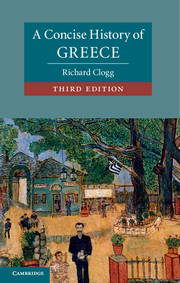Book contents
- Frontmatter
- Dedication
- Contents
- List of Illustrations
- Preface
- 1 Introduction
- 2 Ottoman rule and the emergence of the Greek state 1770–1831
- 3 Nation building, the ‘Great Idea’ and National Schism 1831–1922
- 4 Catastrophe and occupation and their consequences 1923–49
- 5 The legacy of the civil war 1950–74
- 6 The consolidation of democracy and the populist decade 1974–90
- 7 Balkan turmoil and political modernisation: Greece in the 1990s
- 8 Greece in the new Millennium: from affluence to austerity
- Biographies
- The Royal Houses of Greece
- Presidents
- Tables
- Key Dates
- Guide To Further Reading
- Index
1 - Introduction
Published online by Cambridge University Press: 05 June 2014
- Frontmatter
- Dedication
- Contents
- List of Illustrations
- Preface
- 1 Introduction
- 2 Ottoman rule and the emergence of the Greek state 1770–1831
- 3 Nation building, the ‘Great Idea’ and National Schism 1831–1922
- 4 Catastrophe and occupation and their consequences 1923–49
- 5 The legacy of the civil war 1950–74
- 6 The consolidation of democracy and the populist decade 1974–90
- 7 Balkan turmoil and political modernisation: Greece in the 1990s
- 8 Greece in the new Millennium: from affluence to austerity
- Biographies
- The Royal Houses of Greece
- Presidents
- Tables
- Key Dates
- Guide To Further Reading
- Index
Summary
All countries are burdened by their history, but the past weighs particularly heavily on Greece. It is still, regrettably, a commonplace to talk of ‘modern Greece’ and of ‘modern Greek’ as though ‘Greece’ and ‘Greek’ must necessarily refer to the ancient world. The burden of antiquity has been both a boon and a bane. The degree to which the language and culture of the ancient Greek world was revered throughout Europe (and, indeed, in the United States where some of the founding fathers were nurtured on the classics) during the critical decades of the national revival in the early nineteenth century was a vital factor in stimulating in the Greeks themselves, or at least in the nationalist intelligentsia, a consciousness that they were the heirs to a heritage that was universally admired. Such an awareness had scarcely existed during the centuries of Ottoman rule and this ‘sense of the past’, imported from western Europe, was a major constituent in the development of the Greek national movement, contributing significantly to its precocity in relation to other Balkan independence movements. The heritage of the past was also important in exciting the interest of liberal, and indeed of conservative, opinion in the fate of the insurgent Greeks. In the 1820s, even such an unreconstructed pillar of the traditional order as Viscount Castlereagh, the British foreign secretary, was moved to ask whether ‘those, in admiration of whom we have been educated, be doomed . . . to drag out, for all time to come, the miserable existence to which circumstances have reduced them’. Indeed such attitudes have persisted to the present. During the debate in the British parliament in 1980 over ratification of Greek membership of the European Community, a foreign office minister intoned that Greece’s entry would be seen as a ‘fitting repayment by the Europe of today of the cultural and political debt that we all owe to a Greek heritage almost three thousand years old’.
- Type
- Chapter
- Information
- A Concise History of Greece , pp. 1 - 6Publisher: Cambridge University PressPrint publication year: 2013

